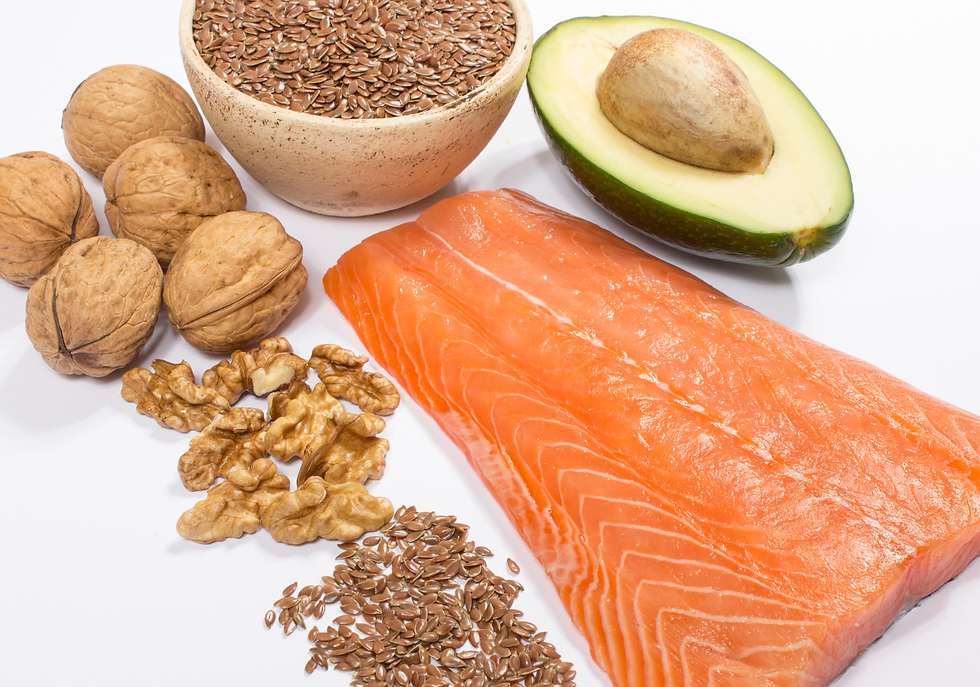Which Fats Are Good For Your Skin?
- Apr 8, 2024
- 4 min read
Updated: Jan 17, 2025

As you’ve probably noticed, I’m passionate about helping people optimize their lifestyle for skin health (and overall health). One of the most important factors is diet. What we choose to eat can make a huge difference in our skin health.
Healthy fats are among the important nutrients that our skin needs. While eating a lot of saturated fat (found in foods like red meat, cheese, and butter) can increase skin inflammation, eating polyunsaturated fats (found in foods like avocados, olive oil, and nuts) can help to keep your skin healthy.
One of the most beneficial types of fat for the skin are the omega-3s. These powerful compounds can have a huge impact on your skin health. If you have a chronic skin condition, you can’t afford to ignore these powerful compounds.
Why does the skin need omega-3 fats?
In order to function well, the skin needs to create a barrier against the outside world. This skin barrier contains certain types of fats known as ceramides, which allows it to be waterproof. When the barrier isn’t functioning well, then substances from the outside world (like allergens) can get through and cause inflammation, which can lead to a flare-up.
In order to form the skin barrier, the skin needs enough of the right fats. Omega-3 fats have been shown to increase the skin’s ability to produce the ceramides that form the skin barrier. This helps to keep out substances that can cause irritation and inflammation.

In addition, it’s well-known that omega-3s are anti-inflammatory. They act as signals within the immune system, helping to keep it from getting out of control and causing damage to your skin. For people who have inflammatory skin conditions like psoriasis, eczema, or acne, making sure to get enough omega-3s can help to keep inflammation from spiraling out of control and causing a flare-up.
So how can you make sure that you’re getting enough omega-3s?
Are all omega-3s the same?
The first thing to know is that omega-3s are actually a whole group of fats. Not all omega-3s are the same – and they don’t necessarily have the same effects on the skin.
There are two main groups of omega-3s – short-chain and long-chain. While all omega-3s have benefits, it’s the long-chain omega-3s that have been shown to have the greatest benefits for skin health.
Two specific long-chain omega-3s, known as EPA and DHA, have been found in many studies to be particularly beneficial for skin health. These compounds can help with psoriasis, eczema, skin sensitivity, and even wound healing. They likely have additional benefits, and a lot of research is currently underway to learn more about the impact of these compounds on skin health.
There are also short-chain omega-3s, like ALA. Although ALA does have some benefits for the skin, it’s best to ensure that you’re getting enough of the long-chain omega-3s like EPA and DHA if you want to get the skin health benefits.
Where can you get long-chain omega-3s?
Some sources of omega-3s contain long-chain omega-3s, while others contain almost entirely the short-chain ones. Fatty fish or fish oil are the best sources of the long-chain omega-3s like EPA and DHA.
However, most plant-based sources of omega-3s (like chia seeds, flaxseeds, and nuts) hardly contain EPA and DHA at all. They have primarily ALA. There’s some conversion of ALA into EPA and DHA in the body, and it used to be believed that a person could get enough of these long-chain omega-3s from eating ALA. However, research has now shown that the conversion actually occurs at very low levels. Eating ALA simply isn’t going to provide you with enough EPA and DHA to help protect your skin.

Some people choose to eat fish two to three times a week, or to take fish oil daily, in order to get enough long-chain omega-3s to get the skin health benefits. However, some people prefer to avoid fish for various reasons. They may be vegan or vegetarian. They might be concerned about the environmental impact of fishing on the oceans or about potential toxins in fish. If you prefer to avoid fish, there are plant-based supplements made from algae oil that can give you long-chain omega-3s. Check on the label to ensure that the product you’re considering contains EPA and DHA.
In general, the recommendation is to consume about 250 to 500 mg of omega-3s per day. However, different people may need different amounts. Medical organizations have not yet been able to determine exactly how much omega-3 people need for optimal health, so you may need to experiment a bit to find out what works for you.
Support for your skin-healthy diet
If you’re wanting to learn more about how your diet can impact your skin, consider joining us inside Mind Gut Skin Academy. I share about how different nutrients affect your skin health, and offer practical tips on how to create a skin-healthy diet that you’ll also enjoy eating. You can also get advice from fellow Skin Warriors in one of our beautiful communities.




Comments